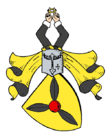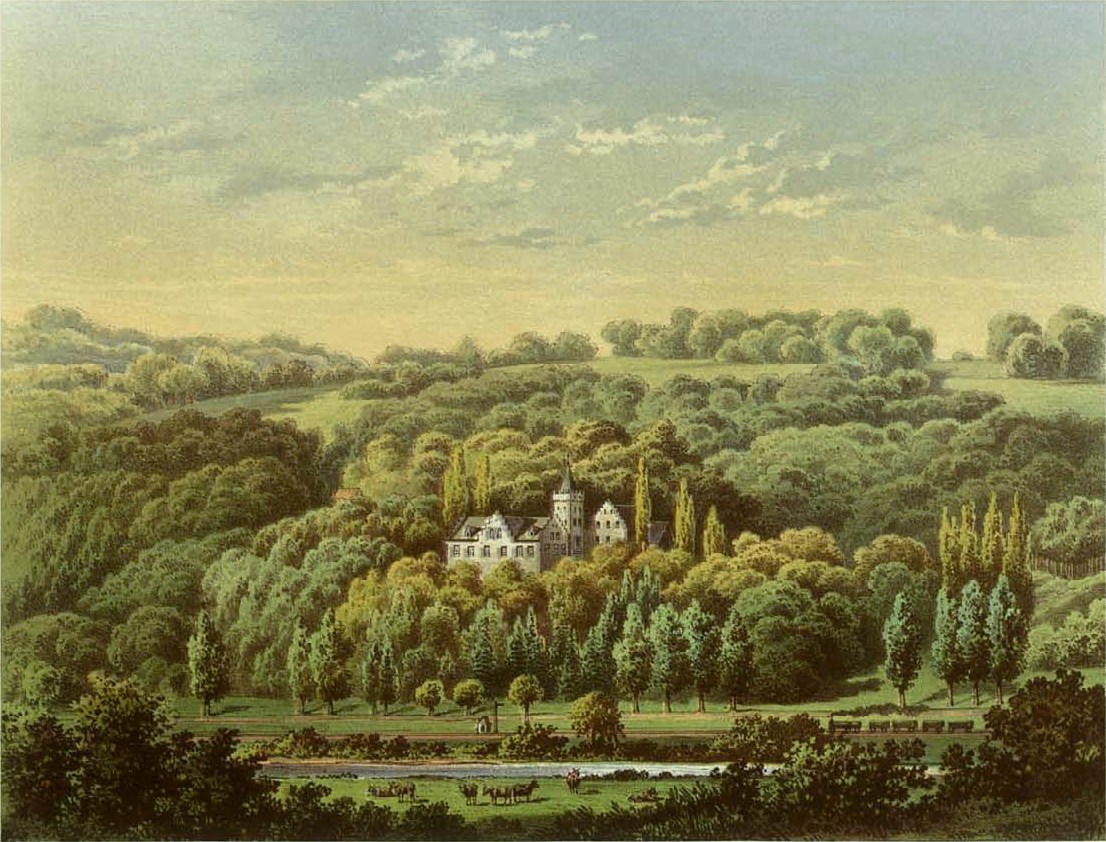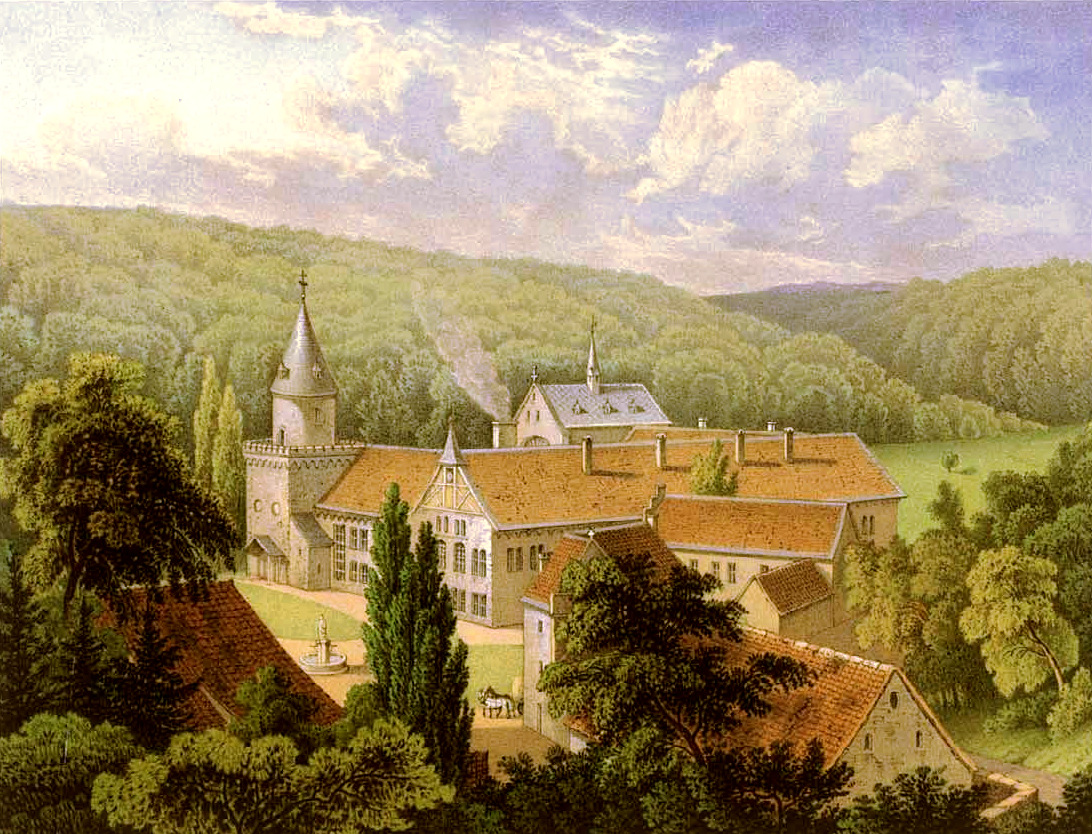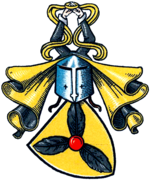User:Dust of the world/sandbox: Difference between revisions
No edit summary |
|||
| Line 33: | Line 33: | ||
== History == |
== History == |
||
[[ |
[[Image:Haus Mallinckrodt Sammlung Duncker.jpg|mini|[[Haus Mallinckrodt|Burg Mallinckrodt]] um 1860, Sammlung [[Alexander Duncker]]]] |
||
The family was first mentioned in a 1241 document that featured a knight named '''Ludwig de Mesekenwerke'''. The family later named themselves after their seat Castle Mallinckrodt, which they owned as a fief of the Lords of Volmarstein from around 1250. The family also owned a number of the surrounding farms, including Gut Obergedern and Gut Hoven in Oberwengern (later Howe House). [[Gamburg Castle]] has been owned by the family since 1980. |
The family was first mentioned in a 1241 document that featured a knight named '''Ludwig de Mesekenwerke'''. The family later named themselves after their seat Castle Mallinckrodt, which they owned as a fief of the Lords of Volmarstein from around 1250. The family also owned a number of the surrounding farms, including Gut Obergedern and Gut Hoven in Oberwengern (later Howe House). [[Gamburg Castle]] has been owned by the family since 1980. |
||
== Dortmund branch == |
== Dortmund branch == |
||
A younger branch of the family goes back to "Evert Mallinchroide (Eberhard Mallinckrodt)", who was mentioned in a document from 1488–1516 and died in 1526 - landowner in [[Recklinghausen]] and [[Dortmund]]. His descendants did not originally belong to the patriciate of the city, but rose to the notable bourgeoisie of the city in the 16th century. The Mallinckrodts belonged to the guild of the |
A younger branch of the family goes back to "Evert Mallinchroide (Eberhard Mallinckrodt)", who was mentioned in a document from 1488–1516 and died in 1526 - landowner in [[Recklinghausen]] and [[Dortmund]]. His descendants did not originally belong to the patriciate of the city, but rose to the notable bourgeoisie of the city in the 16th century. The Mallinckrodts belonged to the guild of the garment tailors and earned their fortune with the cloth trade. The membership in those guilds where, since 1589, more than 30 members of the family were demonstrably active, gave the family a seat in the city council. |
||
From 1605 to 1805 there were 16 representatives of the family in the Dortmund council. Two of them became [[mayor]]s and another four held the office of |
From 1605 to 1805 there were 16 representatives of the family in the Dortmund council. Two of them became [[mayor]]s and another four held the office of city judge. |
||
At the beginning of the 20th century there was a dispute among aristocracy researchers about the nobility recognition of this Dortmund line, since the direct descent to the old noble family of the ``von Mallinckrodt '' could not be proven. In 1902-1903 the von Mallinckrodt family was recognized as the '''[[Uradel]]''' (Ancient Nobility) by the [[Heraldic authority]] in [[Berlin]]. |
At the beginning of the 20th century there was a dispute among aristocracy researchers about the nobility recognition of this Dortmund line, since the direct descent to the old noble family of the ``von Mallinckrodt '' could not be proven. In 1902-1903 the von Mallinckrodt family was recognized as the '''[[Uradel]]''' (Ancient Nobility) by the [[Heraldic authority]] in [[Berlin]]. |
||
Franz Mallinckrodt was the mayor of Dortmund between 1812 and 1832. His nephew was the publicist [[Arnold Andreas Friedrich Mallinckrodt | Arnold Mallinckrodt]] (1768-1825). [[Detmar von Mallinckrodt]] (1769–1842) was the Supreme Government Council (''Oberregierungsrat'') who worked in [[Aachen]] and retired in [[Paderborn]]. His children were politicians [[Hermann von Mallinckrodt]] and [[Georg von Mallinckrodt]] as well as the founder of the order [[Pauline von Mallinckrodt]], who was beatified in 1985 and who also founded the Mallinckrodt Gymnasium in Dortmund. <ref> {{ citation | periodical = Mallinckrodt-Gymnasium | title = Over 165 years of school history {{!}} Mallinckrodt-Gymnasium | language = German | url = http://www.mallinckrodt-gymnasium.de/unser-mallinckrodt/ueber-165/ | access-date = 2017-03-07 |
Franz Mallinckrodt was the mayor of Dortmund between 1812 and 1832. His nephew was the publicist [[Arnold Andreas Friedrich Mallinckrodt | Arnold Mallinckrodt]] (1768-1825). [[Detmar von Mallinckrodt]] (1769–1842) was the Supreme Government Council (''Oberregierungsrat'') who worked in [[Aachen]] and retired in [[Paderborn]]. His children were politicians [[Hermann von Mallinckrodt]] and [[Georg von Mallinckrodt]] as well as the founder of the order [[Pauline von Mallinckrodt]], who was [[Beatification|beatified]] in 1985 and who also founded the Mallinckrodt Gymnasium in Dortmund. <ref> {{ citation | periodical = Mallinckrodt-Gymnasium | title = Over 165 years of school history {{!}} Mallinckrodt-Gymnasium | language = German | url = http://www.mallinckrodt-gymnasium.de/unser-mallinckrodt/ueber-165/ | access-date = 2017-03-07 |
||
}} </ref>. |
}} </ref>. |
||
| Line 49: | Line 49: | ||
== Adelserhebungen und Adelsanerkennungen == |
== Adelserhebungen und Adelsanerkennungen == |
||
[[ |
[[File:Kloster Böddeken near Büren (Alexander Duncker).jpg|thumb|alt=Trikata Castle|Trikata Castle, near the camp of the Livonian Confederation forces]] |
||
[[Image:Kloster Böddeken near Büren (Alexander Duncker).jpg|mini|Böddeken monastery (painting by [[Alexander Duncker]], 19. Jh.)]] |
|||
[[Detmar von Mallinckrodt|Detmar Mallinckrodt]], [[Gutsherr]] auf Gut [[Böddeken]] (heute in [[Wewelsburg (Ort)|Wewelsburg]]) im früheren [[Kreis Büren|Landkreis Büren]] und königlich preußischer Regierungsvizepräsident in [[Aachen]], wurde am 18. Juli 1834 in Berlin in den [[Preußen|preußischen]] Adelsstand erhoben. Dessen Nachkommen erhielten am 4. Juli 1903 die preußische Anerkennung des alten Adels und der Zugehörigkeit zum alten Adelsgeschlecht derer ''von Mallinckrodt''. Am 18. September 1912 erklärte das Königliche Heroldsamt in Berlin, dass der 1834 verliehene Adelsstand als solcher nicht mehr fortbesteht, sondern durch die Anerkennung von 1903 in Wegfall gekommen ist. |
[[Detmar von Mallinckrodt|Detmar Mallinckrodt]], [[Gutsherr]] auf Gut [[Böddeken]] (heute in [[Wewelsburg (Ort)|Wewelsburg]]) im früheren [[Kreis Büren|Landkreis Büren]] und königlich preußischer Regierungsvizepräsident in [[Aachen]], wurde am 18. Juli 1834 in Berlin in den [[Preußen|preußischen]] Adelsstand erhoben. Dessen Nachkommen erhielten am 4. Juli 1903 die preußische Anerkennung des alten Adels und der Zugehörigkeit zum alten Adelsgeschlecht derer ''von Mallinckrodt''. Am 18. September 1912 erklärte das Königliche Heroldsamt in Berlin, dass der 1834 verliehene Adelsstand als solcher nicht mehr fortbesteht, sondern durch die Anerkennung von 1903 in Wegfall gekommen ist. |
||
Revision as of 19:21, 13 April 2021
| Mallinckrodt Mallinchroide | |
|---|---|
| Noble house | |
 House of Mallinckrodtcoat of arms | |
| Country | Westphalia |
| Founded | 1241 (first mentioned) |
| Founder | Ludwig de Mesekenwerke |
| Estate(s) | Gamburg Castle, Castle Mallinckrodt |
Mallinckrodt is a German noble house from County of Mark in Westphalia.
History
 The family was first mentioned in a 1241 document that featured a knight named Ludwig de Mesekenwerke. The family later named themselves after their seat Castle Mallinckrodt, which they owned as a fief of the Lords of Volmarstein from around 1250. The family also owned a number of the surrounding farms, including Gut Obergedern and Gut Hoven in Oberwengern (later Howe House). Gamburg Castle has been owned by the family since 1980.
The family was first mentioned in a 1241 document that featured a knight named Ludwig de Mesekenwerke. The family later named themselves after their seat Castle Mallinckrodt, which they owned as a fief of the Lords of Volmarstein from around 1250. The family also owned a number of the surrounding farms, including Gut Obergedern and Gut Hoven in Oberwengern (later Howe House). Gamburg Castle has been owned by the family since 1980.
Dortmund branch
A younger branch of the family goes back to "Evert Mallinchroide (Eberhard Mallinckrodt)", who was mentioned in a document from 1488–1516 and died in 1526 - landowner in Recklinghausen and Dortmund. His descendants did not originally belong to the patriciate of the city, but rose to the notable bourgeoisie of the city in the 16th century. The Mallinckrodts belonged to the guild of the garment tailors and earned their fortune with the cloth trade. The membership in those guilds where, since 1589, more than 30 members of the family were demonstrably active, gave the family a seat in the city council.
From 1605 to 1805 there were 16 representatives of the family in the Dortmund council. Two of them became mayors and another four held the office of city judge.
At the beginning of the 20th century there was a dispute among aristocracy researchers about the nobility recognition of this Dortmund line, since the direct descent to the old noble family of the ``von Mallinckrodt could not be proven. In 1902-1903 the von Mallinckrodt family was recognized as the Uradel (Ancient Nobility) by the Heraldic authority in Berlin.
Franz Mallinckrodt was the mayor of Dortmund between 1812 and 1832. His nephew was the publicist Arnold Mallinckrodt (1768-1825). Detmar von Mallinckrodt (1769–1842) was the Supreme Government Council (Oberregierungsrat) who worked in Aachen and retired in Paderborn. His children were politicians Hermann von Mallinckrodt and Georg von Mallinckrodt as well as the founder of the order Pauline von Mallinckrodt, who was beatified in 1985 and who also founded the Mallinckrodt Gymnasium in Dortmund. [1].
The further rise of this branch of the family took place outside of Dortmund. In the Rhineland and Belgium they worked as cloth traders. Edward Mallinckrodt Sr. (1845–1928), a grandson of Arnold Mallinckrodt, founded the Mallinckrodt Chemical Works company in 1867 with his two brothers Otto († 1878) and Gustav († 1877) in St. Louis, Missouri. In the 20th century, Georg Wilhelm von Mallinckrodt (* 1930) moved to London, where he married Charmaine Schröder and became a partner in Schroders.
Adelserhebungen und Adelsanerkennungen

 Detmar Mallinckrodt, Gutsherr auf Gut Böddeken (heute in Wewelsburg) im früheren Landkreis Büren und königlich preußischer Regierungsvizepräsident in Aachen, wurde am 18. Juli 1834 in Berlin in den preußischen Adelsstand erhoben. Dessen Nachkommen erhielten am 4. Juli 1903 die preußische Anerkennung des alten Adels und der Zugehörigkeit zum alten Adelsgeschlecht derer von Mallinckrodt. Am 18. September 1912 erklärte das Königliche Heroldsamt in Berlin, dass der 1834 verliehene Adelsstand als solcher nicht mehr fortbesteht, sondern durch die Anerkennung von 1903 in Wegfall gekommen ist.
Detmar Mallinckrodt, Gutsherr auf Gut Böddeken (heute in Wewelsburg) im früheren Landkreis Büren und königlich preußischer Regierungsvizepräsident in Aachen, wurde am 18. Juli 1834 in Berlin in den preußischen Adelsstand erhoben. Dessen Nachkommen erhielten am 4. Juli 1903 die preußische Anerkennung des alten Adels und der Zugehörigkeit zum alten Adelsgeschlecht derer von Mallinckrodt. Am 18. September 1912 erklärte das Königliche Heroldsamt in Berlin, dass der 1834 verliehene Adelsstand als solcher nicht mehr fortbesteht, sondern durch die Anerkennung von 1903 in Wegfall gekommen ist.
Dieselbe Adels- und Zugehörigkeitsanerkennung hatte zuvor am 19. Juli 1902 mit Diplom vom 8. September 1902 schon Gustav von Mallinckrodt erhalten, Großkaufmann, Fabrik- und Gutsbesitzer, königlich preußischer Geheimer Kommerzienrat, sowie die Witwe Anna und die Söhne Paul und Max seines bereits 1880 verstorbenen Bruders Felix Mallinckrodt, königlich preußischer Bergreferendar und Gutsbesitzer.
Wappen
In Gold eine mit drei schmalen spitzen schwarzen Blättern im Schächerkreuz besteckte rote Kugel; auf dem Helm mit schwarz-goldenen Decken zwei wachsende Arme in schwarzen Ärmeln mit silbernen Aufschlägen und naturfarbenen Händen, deren aufgerichtete Zeigefinger durch einen glatten goldenen Ring gesteckt sind.
-
Wappen der Mallinckrodt im Wappenbuch des Westfälischen Adels, ca. 1902
-
Wappengrafik von Otto Hupp im Münchener Kalender von 1919
-
Wappen an der Bodleian Library, Oxford
Personalities
[[Bild:Mallinckrodt.jpg|mini|Bernhard von Mallinckrodt (1591–1664), Domdechant]]
- Arnold Andreas Friedrich Mallinckrodt (1768–1825), Schriftsteller, Verleger und Publizist
- Bernhard von Mallinckrodt (1591–1664), Domdechant in Münster
- sein Neffe Bernhard von Mallinckrodt († 1676), Domherr in Münster
- Eberhard von Mallinckrodt (vor 1600–1658), Domkantor und Domkellner in Münster
- Gustav von Mallinckrodt (1859–1939), deutscher Industrieller und Politiker
- Heinrich von Mallinckrodt (1590–1649), Domvikar in Münster und Domkantor in Osnabrück
- Hermann von Mallinckrodt (1821–1874), deutscher Politiker und Mitgründer der katholischen Zentrumspartei
- Max von Mallinckrodt (1873–1944), Pseudonym: Max Wetter, Gutsbesitzer und Schriftsteller
- Meinulf von Mallinckrodt (1861–1947), von 1897 bis 1926 Landrat des Kreises Meschede
- Pauline von Mallinckrodt (1817–1881), Ordensgründerin der Kongregation der Schwestern der Christlichen Liebe, 1985 seliggesprochen
- Rebekka von Mallinckrodt (* 1971), Historikerin
- George von Mallinckrodt (1930 – 2021), a German merchant banker
Literatur
- Genealogisches Handbuch des Adels, Adelslexikon Band VIII, Band 113 der Gesamtreihe, C. A. Starke Verlag, Limburg (Lahn) 1997, ISSN 0435-2408
- August Meininghaus: Der soziale Aufstieg der Dortmunder Mallinckrodt. In: Beiträge zur Geschichte Dortmunds und der Grafschaft Mark 44, 1938, S. 369
- Dietrich von Mallingrodt, Werner Frese (Bearbeiter): Die von Mallinckrodt zu Steinberg und ihre Nachkommen in Dortmund und Paderborn. In: Beiträge zur Geschichte Dortmunds und der Grafschaft Mark 78, 1987, S. 31
- Gustav von Mallinckrodt: Urkundenbuch der Familie von Mallinckrodt. Erster Band: Urkunden 1250–1580, Carl Georgi Verlag, Bonn 1911 (Digitalisat)
- Gustav von Mallinckrodt: Urkundenbuch der Familie von Mallinckrodt. Zweiter Band: Urkunden 1581–1650, Nachträge 1397-1627, Aufschwörungen, Register, Siegel und Denkmäler, Carl Georgi Verlag, Bonn 1911 (Digitalisat)
- Kurt Theodor Otto Friedrich von Mallinckrodt: Sippendatei derer von Mallinckrodt 1241–1990. Dortmund: Selbstverlag, 1992
- Christoph Franke: Wirtschaft und Politik als Herausforderung. Die liberalen Unternehmer (von) Mallinckrodt im 19. Jahrhundert (= Zeitschrift für Unternehmensgeschichte, Beiheft 88), Stuttgart 1995.
Weblinks
Einzelnachweise
- ^ "Over 165 years of school history | Mallinckrodt-Gymnasium", Mallinckrodt-Gymnasium (in German), retrieved 2017-03-07



